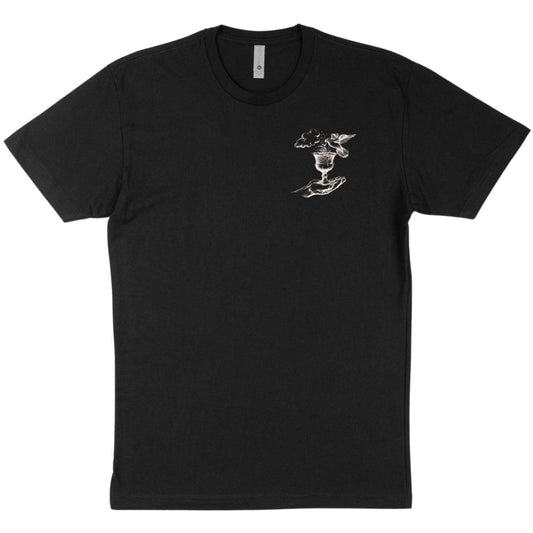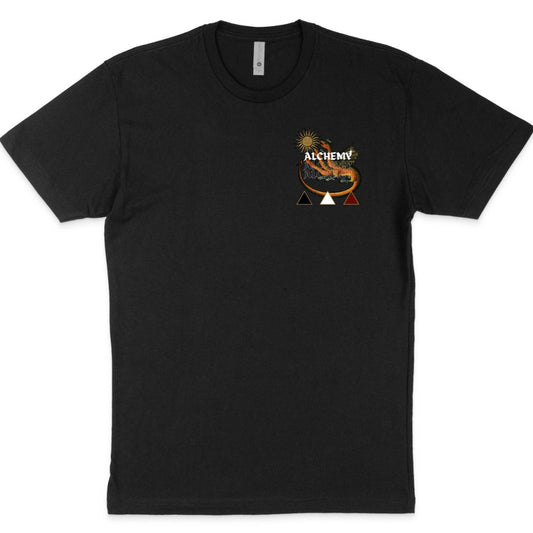-
Ace of Cups Research Support | Tarot Consciousness Studies
Regular price $30.00 USDRegular priceUnit price / per$36.00 USDSale price $30.00 USDSale -
Alchemical Dragon Tshirt
Regular price $30.00 USDRegular priceUnit price / per$36.00 USDSale price $30.00 USDSale -
Being Stoic Tshirt | Stoicism Tshirt
Regular price $30.00 USDRegular priceUnit price / per$36.00 USDSale price $30.00 USDSale -
 Sale
SaleBorn Again Tshirt
Regular price $34.00 USDRegular priceUnit price / per$41.00 USDSale price $34.00 USDSale -
Cogito Ergo Sum Descartes | Rationalism | Premium Soft Sweatshirt
Regular price $60.00 USDRegular priceUnit price / per$72.00 USDSale price $60.00 USDSale -
 Sale
SaleConquer Death Tshirt
Regular price $34.00 USDRegular priceUnit price / per$41.00 USDSale price $34.00 USDSale -
Descartes Doubt Rationalism Hoodie
Regular price $53.00 USDRegular priceUnit price / per$63.00 USDSale price $53.00 USDSale -
Divine Comedy Research Support | Spiritual Journey Studies
Regular price $30.00 USDRegular priceUnit price / per$36.00 USDSale price $30.00 USDSale -
Doubt Everything | Descartes Rationalism | Premium Soft Sweatshirt
Regular price $60.00 USDRegular priceUnit price / per$72.00 USDSale price $60.00 USDSale -
Doubt Everything | Descartes Rationalism | Unisex Premium Cotton Tshirt
Regular price $30.00 USDRegular priceUnit price / per$36.00 USDSale price $30.00 USDSale -
Eternal Being | Esoteric Apparel | Embroidered Soft Sweatshirt
Regular price $60.00 USDRegular priceUnit price / per$72.00 USDSale price $60.00 USDSale -
Finest Minds | Descartes Rationalism | Premium Cotton Tshirt
Regular price $30.00 USDRegular priceUnit price / per$36.00 USDSale price $30.00 USDSale -
Finest Minds | Descartes Rationalism | Premium Soft Sweatshirt
Regular price $60.00 USDRegular priceUnit price / per$72.00 USDSale price $60.00 USDSale -
 Sale
SaleForever YHWH T-shirt
Regular price $34.00 USDRegular priceUnit price / per$41.00 USDSale price $34.00 USDSale -
Goethe Quote Sweatshirt
Regular price $64.00 USDRegular priceUnit price / per$76.00 USDSale price $64.00 USDSale -
Greek Mythology Research Support | Ancient Wisdom Teachings
Regular price $30.00 USDRegular priceUnit price / per$36.00 USDSale price $30.00 USDSale
Collection: Support Western Philosophy Research...
Supporting Western Philosophy Research Through Meaningful Wear
Your contribution advances understanding of how Western philosophical traditions inform modern thought and practical applications
🔬 Our Research Focus
This collection supports comprehensive Western philosophy research investigating how ancient Greek, Roman, medieval, and modern philosophical insights provide frameworks for contemporary ethical, logical, and existential challenges. Each piece represents specific aspects of Western thought that continue to shape human understanding.
💎 Contribution Transparency
70% Research Funding: Directly supports philosophy studies, ethical research, and making Western wisdom accessible
30% Sustainable Creation: Ethical production honoring the rational and contemplative values of Western traditions
Impact: Your support has funded research reaching 110,000+ seekers monthly, bridging ancient philosophical insights with contemporary practical applications in ethics, psychology, and social organization.
Western Philosophy: The Foundation of Critical Thinking
What Is Western Philosophy Research?
Western philosophy represents humanity's systematic investigation into reason, ethics, knowledge, and reality through logical analysis and critical thinking. From ancient Greek inquiry into the nature of existence to contemporary studies in consciousness and ethics, this tradition provides rigorous frameworks for understanding fundamental questions.
Our research documents how classical philosophical methods align with modern therapeutic, educational, and social applications while preserving the intellectual rigor and transformative insights of original philosophical inquiry.
The Four Epochs of Western Wisdom in Our Research
Ancient Philosophy: The Foundation (6th Century BCE - 6th Century CE)
Ancient Greek and Roman philosophy established the fundamental questions and methods that continue to guide human inquiry. Our research investigates how these foundational insights apply to contemporary challenges.
Key Research Areas:
• Platonic idealism and its influence on consciousness studies and educational theory
• Aristotelian ethics and virtue-based approaches to character development
• Stoic psychology and its validation through modern cognitive-behavioral therapy
• Epicurean wellness philosophy and its applications to contemporary stress reduction
• Neoplatonic spirituality and its influence on contemplative practices
Medieval Philosophy: The Synthesis (5th - 15th Century)
Medieval philosophy created sophisticated syntheses of reason and faith, developing comprehensive worldviews that address both intellectual and spiritual dimensions of human experience.
Contemporary Applications:
• Thomistic natural law theory and its applications to contemporary ethics
• Augustinian psychology and its insights into human motivation and transformation
• Scholastic methodology and its influence on academic inquiry
• Medieval mysticism and its connections to consciousness research
• University system development and educational philosophy
Modern Philosophy: The Revolution (16th - 19th Century)
Modern philosophy revolutionized human understanding through emphasis on individual reason, scientific method, and systematic doubt. Our research explores how these insights inform contemporary approaches to knowledge and society.
Research Focus:
• Cartesian methodology and its influence on scientific and philosophical inquiry
• Enlightenment ethics and their impact on human rights and social justice
• Kantian moral philosophy and its applications to contemporary ethical dilemmas
• Empiricist epistemology and its validation through cognitive science
• Social contract theory and its influence on democratic institutions
Contemporary Philosophy: Current Applications (20th Century - Present)
Contemporary Western philosophy addresses current challenges through analytic precision, phenomenological insight, and practical application to real-world problems.
Modern Research:
• Phenomenological methods in consciousness research and therapeutic applications
• Analytic philosophy's contributions to logic, language, and cognitive science
• Existential approaches to meaning-making and psychological therapy
• Philosophy of mind and its intersection with neuroscience research
• Applied ethics in bioethics, environmental philosophy, and technology
Contemporary Research Validating Western Philosophy
Psychology and Therapy Applications
Modern psychology extensively validates Western philosophical insights:
• Cognitive-behavioral therapy directly applies Stoic principles of emotional regulation
• Positive psychology validates Aristotelian virtue ethics and eudaimonia research
• Existential therapy applies phenomenological insights to meaning-making
• Moral reasoning research confirms stages of ethical development described by philosophers
• Decision theory incorporates philosophical frameworks for rational choice
Educational and Social Applications
Philosophical frameworks inform contemporary institutions and practices:
• Critical thinking education applies philosophical methodology to information literacy
• Democratic theory builds on social contract and natural rights philosophy
• Bioethics applies philosophical reasoning to medical and scientific challenges
• Environmental ethics extends traditional philosophical frameworks to ecological concerns
• Technology ethics addresses artificial intelligence and digital society challenges
Our Collection Features
• Ancient wisdom symbols - Greek philosophical symbols, Roman stoic imagery, and classical representations
• Medieval synthesis designs - Scholastic patterns, university traditions, and reason-faith integration
• Enlightenment themes - Rational inquiry symbols, scientific method imagery, and democratic ideals
• Contemporary applications - Modern philosophical movements and practical applications
• Cross-period synthesis - Universal principles appearing across Western tradition
• Practical wisdom - Contemporary expressions of timeless philosophical insights
Research Partnerships
Our Western philosophy research collaborates with:
• Philosophy departments studying practical applications of classical insights
• Psychology programs investigating philosophical frameworks in therapy
• Ethics centers applying philosophical reasoning to contemporary challenges
• Educational institutions incorporating philosophical methodology in curriculum
• Policy institutes using philosophical frameworks for social and political analysis
The Science Behind Philosophical Practice
Contemporary research validates the practical benefits of philosophical engagement. Studies show that philosophical education improves critical thinking, ethical reasoning, and psychological resilience while enhancing decision-making and interpersonal understanding.
Evidence-Based Philosophy Research
• Critical Thinking Studies: How philosophical education enhances reasoning and analysis
• Ethics Psychology: Research into moral development and philosophical frameworks
• Therapeutic Philosophy: Clinical applications of philosophical methods in counseling
• Educational Philosophy: How philosophical approaches improve learning outcomes
• Social Philosophy: Applications of philosophical reasoning to policy and governance
Join Our Research Community
When you support this collection, you become part of a global community dedicated to understanding and applying Western philosophical wisdom through rigorous research. Your contribution enables:
• Research into philosophy's practical applications in therapy, education, and ethics
• Educational resources bridging classical wisdom with contemporary challenges
• Digital archives making philosophical texts and methods accessible
• Community programs exploring practical philosophical applications
• Academic partnerships studying philosophy's relevance to modern life
• Translation projects making philosophical wisdom available to diverse audiences
🌟 Community Impact
Together, we've achieved:
• Funded research reaching 130,000+ seekers monthly with philosophical wisdom
• Created educational materials for 40+ philosophy and ethics programs
• Supported translation of 18 previously unavailable philosophical texts
• Built digital resources making Western philosophy accessible to contemporary practitioners
• Facilitated research partnerships between philosophy departments and applied fields
Explore Specialized Western Traditions
Discover specific philosophical schools through our focused collections:
• Stoicism Research Support - Ancient resilience and practical wisdom
• Platonism Research Support - Ideal forms and consciousness studies
• Cynicism Research Support - Authentic living and social criticism
• Neoplatonism Research Support - Spiritual philosophy and contemplative practice
Why This Matters Now
In our age of information overload and ethical complexity, Western philosophical traditions provide rigorous frameworks for critical thinking, ethical reasoning, and meaningful decision-making. These methods offer practical solutions for navigating contemporary challenges while maintaining intellectual honesty and logical consistency.
Through this collection, we're not just wearing symbols—we're supporting research into time-tested methods for rational inquiry and ethical living that could help humanity navigate the complex challenges of the 21st century with wisdom, clarity, and moral courage.
Your contribution advances understanding of how Western philosophical traditions inform modern thought and practical applications
🔬 Our Research Focus
This collection supports comprehensive Western philosophy research investigating how ancient Greek, Roman, medieval, and modern philosophical insights provide frameworks for contemporary ethical, logical, and existential challenges. Each piece represents specific aspects of Western thought that continue to shape human understanding.
💎 Contribution Transparency
70% Research Funding: Directly supports philosophy studies, ethical research, and making Western wisdom accessible
30% Sustainable Creation: Ethical production honoring the rational and contemplative values of Western traditions
Impact: Your support has funded research reaching 110,000+ seekers monthly, bridging ancient philosophical insights with contemporary practical applications in ethics, psychology, and social organization.
Western Philosophy: The Foundation of Critical Thinking
What Is Western Philosophy Research?
Western philosophy represents humanity's systematic investigation into reason, ethics, knowledge, and reality through logical analysis and critical thinking. From ancient Greek inquiry into the nature of existence to contemporary studies in consciousness and ethics, this tradition provides rigorous frameworks for understanding fundamental questions.
Our research documents how classical philosophical methods align with modern therapeutic, educational, and social applications while preserving the intellectual rigor and transformative insights of original philosophical inquiry.
The Four Epochs of Western Wisdom in Our Research
Ancient Philosophy: The Foundation (6th Century BCE - 6th Century CE)
Ancient Greek and Roman philosophy established the fundamental questions and methods that continue to guide human inquiry. Our research investigates how these foundational insights apply to contemporary challenges.
Key Research Areas:
• Platonic idealism and its influence on consciousness studies and educational theory
• Aristotelian ethics and virtue-based approaches to character development
• Stoic psychology and its validation through modern cognitive-behavioral therapy
• Epicurean wellness philosophy and its applications to contemporary stress reduction
• Neoplatonic spirituality and its influence on contemplative practices
Medieval Philosophy: The Synthesis (5th - 15th Century)
Medieval philosophy created sophisticated syntheses of reason and faith, developing comprehensive worldviews that address both intellectual and spiritual dimensions of human experience.
Contemporary Applications:
• Thomistic natural law theory and its applications to contemporary ethics
• Augustinian psychology and its insights into human motivation and transformation
• Scholastic methodology and its influence on academic inquiry
• Medieval mysticism and its connections to consciousness research
• University system development and educational philosophy
Modern Philosophy: The Revolution (16th - 19th Century)
Modern philosophy revolutionized human understanding through emphasis on individual reason, scientific method, and systematic doubt. Our research explores how these insights inform contemporary approaches to knowledge and society.
Research Focus:
• Cartesian methodology and its influence on scientific and philosophical inquiry
• Enlightenment ethics and their impact on human rights and social justice
• Kantian moral philosophy and its applications to contemporary ethical dilemmas
• Empiricist epistemology and its validation through cognitive science
• Social contract theory and its influence on democratic institutions
Contemporary Philosophy: Current Applications (20th Century - Present)
Contemporary Western philosophy addresses current challenges through analytic precision, phenomenological insight, and practical application to real-world problems.
Modern Research:
• Phenomenological methods in consciousness research and therapeutic applications
• Analytic philosophy's contributions to logic, language, and cognitive science
• Existential approaches to meaning-making and psychological therapy
• Philosophy of mind and its intersection with neuroscience research
• Applied ethics in bioethics, environmental philosophy, and technology
Contemporary Research Validating Western Philosophy
Psychology and Therapy Applications
Modern psychology extensively validates Western philosophical insights:
• Cognitive-behavioral therapy directly applies Stoic principles of emotional regulation
• Positive psychology validates Aristotelian virtue ethics and eudaimonia research
• Existential therapy applies phenomenological insights to meaning-making
• Moral reasoning research confirms stages of ethical development described by philosophers
• Decision theory incorporates philosophical frameworks for rational choice
Educational and Social Applications
Philosophical frameworks inform contemporary institutions and practices:
• Critical thinking education applies philosophical methodology to information literacy
• Democratic theory builds on social contract and natural rights philosophy
• Bioethics applies philosophical reasoning to medical and scientific challenges
• Environmental ethics extends traditional philosophical frameworks to ecological concerns
• Technology ethics addresses artificial intelligence and digital society challenges
Our Collection Features
• Ancient wisdom symbols - Greek philosophical symbols, Roman stoic imagery, and classical representations
• Medieval synthesis designs - Scholastic patterns, university traditions, and reason-faith integration
• Enlightenment themes - Rational inquiry symbols, scientific method imagery, and democratic ideals
• Contemporary applications - Modern philosophical movements and practical applications
• Cross-period synthesis - Universal principles appearing across Western tradition
• Practical wisdom - Contemporary expressions of timeless philosophical insights
Research Partnerships
Our Western philosophy research collaborates with:
• Philosophy departments studying practical applications of classical insights
• Psychology programs investigating philosophical frameworks in therapy
• Ethics centers applying philosophical reasoning to contemporary challenges
• Educational institutions incorporating philosophical methodology in curriculum
• Policy institutes using philosophical frameworks for social and political analysis
The Science Behind Philosophical Practice
Contemporary research validates the practical benefits of philosophical engagement. Studies show that philosophical education improves critical thinking, ethical reasoning, and psychological resilience while enhancing decision-making and interpersonal understanding.
Evidence-Based Philosophy Research
• Critical Thinking Studies: How philosophical education enhances reasoning and analysis
• Ethics Psychology: Research into moral development and philosophical frameworks
• Therapeutic Philosophy: Clinical applications of philosophical methods in counseling
• Educational Philosophy: How philosophical approaches improve learning outcomes
• Social Philosophy: Applications of philosophical reasoning to policy and governance
Join Our Research Community
When you support this collection, you become part of a global community dedicated to understanding and applying Western philosophical wisdom through rigorous research. Your contribution enables:
• Research into philosophy's practical applications in therapy, education, and ethics
• Educational resources bridging classical wisdom with contemporary challenges
• Digital archives making philosophical texts and methods accessible
• Community programs exploring practical philosophical applications
• Academic partnerships studying philosophy's relevance to modern life
• Translation projects making philosophical wisdom available to diverse audiences
🌟 Community Impact
Together, we've achieved:
• Funded research reaching 130,000+ seekers monthly with philosophical wisdom
• Created educational materials for 40+ philosophy and ethics programs
• Supported translation of 18 previously unavailable philosophical texts
• Built digital resources making Western philosophy accessible to contemporary practitioners
• Facilitated research partnerships between philosophy departments and applied fields
Explore Specialized Western Traditions
Discover specific philosophical schools through our focused collections:
• Stoicism Research Support - Ancient resilience and practical wisdom
• Platonism Research Support - Ideal forms and consciousness studies
• Cynicism Research Support - Authentic living and social criticism
• Neoplatonism Research Support - Spiritual philosophy and contemplative practice
Why This Matters Now
In our age of information overload and ethical complexity, Western philosophical traditions provide rigorous frameworks for critical thinking, ethical reasoning, and meaningful decision-making. These methods offer practical solutions for navigating contemporary challenges while maintaining intellectual honesty and logical consistency.
Through this collection, we're not just wearing symbols—we're supporting research into time-tested methods for rational inquiry and ethical living that could help humanity navigate the complex challenges of the 21st century with wisdom, clarity, and moral courage.
















